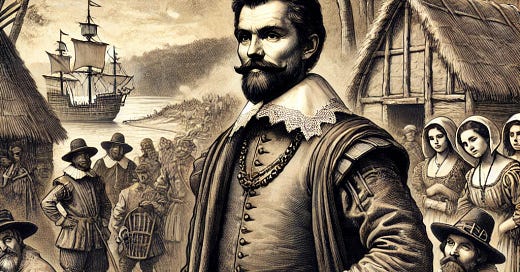Welcome back to "This Day in American History." I'm your host, Chuck Tanraty. Today, we're diving deep into a pivotal moment in the early history of what would become the United States. On September 10, 1608, John Smith was elected president of the Jamestown colony council in Virginia. This event marked a turning point for the fledgling English settlement, which faced many challenges in its early years. Let's explore the significance of John Smith's leadership and the impact it had on the survival of Jamestown, the first permanent English settlement in North America.
To understand the importance of John Smith's presidency, we need to go back to the founding of Jamestown. Established on May 14, 1607, by the Virginia Company of London, Jamestown was intended to be a profitable venture that would expand England's influence and bring wealth from the New World. However, the colonists quickly encountered severe hardships. They faced harsh weather, disease, and frequent conflicts with the Native American tribes in the area, particularly the Powhatan Confederacy. The swampy environment of their settlement also led to a lack of clean water and outbreaks of disease, which further decimated their numbers.
By the summer of 1608, the situation at Jamestown was dire. More than half of the original 104 settlers had died, and the colony was on the brink of collapse. Food supplies were running low, and the remaining settlers were demoralized and disorganized. It was in this context that John Smith, a soldier, explorer, and experienced leader, was elected president of the colony's council. His election marked a significant shift in leadership and strategy for the colony.
John Smith was a man of action, known for his tough and pragmatic leadership style. He famously declared, "He that will not work, shall not eat," a policy that forced the settlers to work for their survival. Smith's approach was both practical and necessary; it instilled a sense of discipline and purpose among the colonists, who had previously been unaccustomed to the hard labor required to sustain their community.
Smith also recognized the importance of building relationships with the Native Americans. He established trade networks with local tribes, exchanging goods for much-needed food supplies. His interactions with the Powhatan Confederacy, including the famous encounter with Pocahontas, the daughter of Chief Powhatan, were critical to the colony's early survival. While there is debate among historians about the accuracy of Smith's accounts, particularly regarding Pocahontas saving his life, there is no doubt that his efforts to engage with the Native Americans were a key factor in the colony's endurance.
Smith's leadership extended beyond just maintaining order and securing resources. In the summer of 1608, he led an extensive exploration of the Chesapeake Bay and its tributaries, mapping the region in detail. These maps were invaluable for future settlers and explorers, providing a clearer understanding of the geography and the resources available in the area. His explorations also helped to identify potential sites for future settlements, laying the groundwork for the expansion of English colonization in North America.
Despite his successes, Smith's time as leader of Jamestown was not without controversy. His strict management style and insistence on discipline often put him at odds with other members of the colony, as well as the Virginia Company officials back in England. Additionally, his relationship with the Native Americans, while initially beneficial, began to deteriorate as tensions over resources and land intensified. Smith's leadership ended abruptly in September 1609 when he was injured in a gunpowder accident and had to return to England for treatment. He would never return to Jamestown.
Nevertheless, Smith's brief presidency had a lasting impact on the colony. Under his leadership, Jamestown weathered its most critical early years, transitioning from a struggling outpost to a more stable settlement. His policies and actions helped establish a foundation that allowed Jamestown to survive, eventually leading to the successful establishment of the Virginia Colony. Without his leadership during those formative years, it is possible that Jamestown might have met the same fate as earlier failed attempts at colonization, such as the Roanoke Colony.
In conclusion, John Smith's election as president of the Jamestown council on September 10, 1608, was a turning point in the history of the colony and, by extension, the future United States. His leadership, characterized by pragmatism, discipline, and a willingness to engage with the Native Americans, was crucial to the survival of the settlement. As we reflect on this day, we are reminded of the challenges faced by the early colonists and the determined individuals who played a role in shaping the early course of American history.
Thank you for joining us on this journey through history. Tune in tomorrow for another enlightening episode of "This Day in American History." I'm Chuck Tanraty, signing off.












Share this post